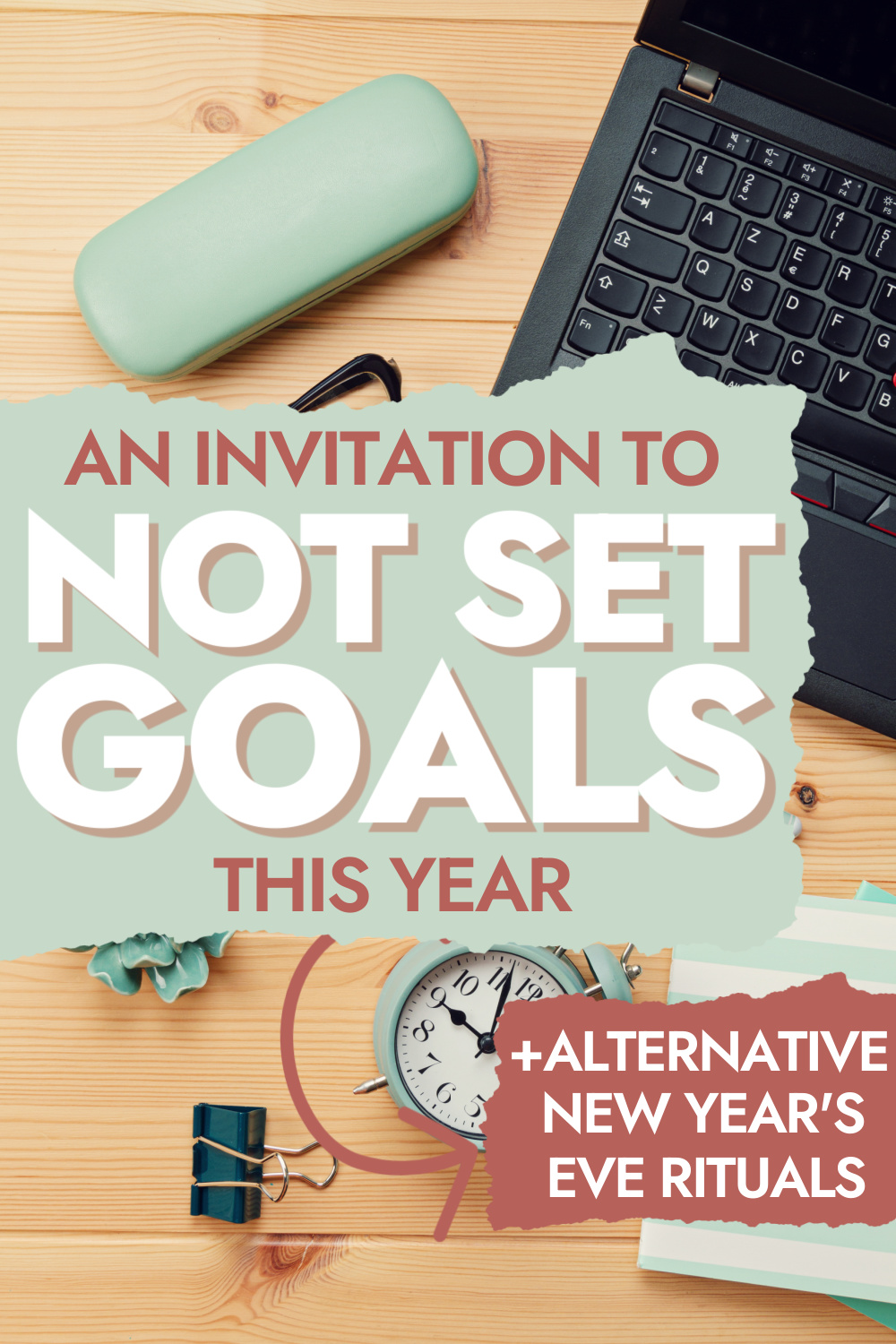Inside: Are you tired of endless goal-setting? Consider this your invitation to try life without goals this year, along with suggestions for alternative New Year’s Eve rituals.
You know those giant, half gallon water jugs?
The ones with lines like, “You’ve got this!” towards the top, or “Almost there!” towards the bottom, silently urging you to drink every single ounce?
Well, last month, I saw one. It was sitting on the desk of an intake coordinator at the local hospital.
Curious, I asked her “Does it really help you drink more water?”
She sheepishly eyed the still nearly full jug, glanced at the late hour on the clock and said wryly, “It’s almost three o’clock. What does that tell you?”
I’m sure that jug was yet another item full of promises.
Want to drink more water? If you buy this jug, you will achieve your goal. Just having it by your side will encourage you to drink more water this year!
It doesn’t always work out like the ads promise, though, does it?
But maybe the jug isn’t the problem. Maybe the person who sold it to her isn’t either.
Maybe the problem is goal-setting itself.

What If You Decided to Try Life Without Goals This Year?
This post probably contains affiliate links, which means I may earn a commission if you make a purchase through those links. As an Amazon Associate, I earn from qualifying purchases. You can find our full disclosure HERE.
New Year’s Eve is right around the corner.
The wrapping paper barely hits the landfill before marketing teams everywhere launch their “better you, better life” campaigns, built squarely on the shoulders of the New Year’s annual goal-setting ritual.
And those campaigns are chock full of subtle messages that this exercise machine or that planner or this water bottle will help you reach your freshly chosen goals.
I’ve read enough about the history of work, productivity and self-improvement in the past two years to tell you one thing: humans were not built for endless productivity and goal-setting (for more, see the book Do Nothing).
A few years ago, I decided to opt out. I stopped setting annual goals.
And I’m here to tell you that life without annual goals can be pretty dang awesome.
So if you find yourself exhausted and discouraged from the endless New Year’s Eve cycle of setting goals that you inevitably fall short of achieving, I’m here to offer you a kind of crazy alternative:
What if you didn’t set any goals at all? What if you tried living a life without goals this year?
It might not be a forever thing. Take it one year off at a time.
You Might Also Like: How to Stop Obsessing Over a Clean House and Reclaim Your Time

Can You Still Have Dreams Without Setting Annual Goals?
First, though, lest you think not setting goals means you can’t have any ambitions at all, a little bit of explanation on the difference between dreams and annual goals (at least to me).
The short answer is: yes. But first, I’ll set out my personal working definition of goals, so we’re on the same page.
Goal: “something you set out to achieve, a milestone you decide to try to meet in a specific amount of time. They are all or nothing – you either achieve them, or you don’t.”
I’m talking about dropping those annual, way too big goals. Not the tasks that keep your daily life ticking along.
I listened to a favorite podcast recently where the host encouraged listeners (all entrepreneurs) to set big, scary goals. The twist? She could care less whether or not we achieved them.
According to her, the purpose of goal-setting is to push you to do more than you thought you could, work harder, get your butt in gear, not necessarily for meeting said goals.
(I guess we just get the timeline wrong sometimes.)
While I love this particular podcaster, I just can’t get on board with that idea. At least, not when you call it a goal that you’re hustling to achieve.
Caring less about achieving a goal? Say what?!
Setting goals I didn’t meet only depressed me. I would always set goals far higher than was humanly possible for me to achieve, like she suggested, and when I didn’t meet them, I’d feel like a failure.
Failing over and over again was unsustainable, especially since I’m an achiever by nature.
Do I still have dreams? Yes, but only a few, really, which include things like:
- achieving financial independence
- my business eventually being enough to support our family, if necessary
- staying healthy and strong into old age
Maybe these dreams are goals to some.
But to me, dreams are “wow, that would be so awesome” things. They’re more along the lines of manifesting something then achieving it.
It detaches the pressure from it. They might be achieved in a year, five years or ten years.
Will I ever set goals again? Maybe…but I’m leaning towards probably not.
I’m becoming more and more o.k. with wanting a mediocre life.
You Might Also Like: I Tried Not Buying Clothes for a Year. Here’s What I Learned

5 Advantages of Living Life Without Goals
How is life better without goals?
A few benefits I’ve experienced over the past few years…
1. Adopting a glass-half-full mindset is easier.
Goals are so concrete, at least to me. You either achieve them, or you don’t.
Again, some blessed people are able to appreciate a half-achieved goal and give themselves a pat on the back.
I never could: all I saw was a goal I didn’t meet.
Life without goals? When you look back at the year (or the week or the month) you can finally see all you did accomplish, instead of what you didn’t.
Or you’re free to not think about accomplishments AT ALL. What a bizarre concept in our productivity-obsessed culture.
2. Life’s inevitable curve balls don’t derail your goals.
How many times did I set a goal only to have something unexpected happen that completely derailed what I thought was going to be achievable?
The past several years have taught me that life is constantly throwing curve balls – every few months, in fact.
Deaths.
Pandemics.
Injuries.
You can’t plan for them, except to know that they will always come, in one form or another.
Life’s curve balls are hard enough to handle as it is, without the added pressure of knowing they’re stopping you from achieving your goals.
3. You can prioritize rest and self-care.
Big, scary goals pushed me to work all.the.time. I couldn’t stop, and when I did, I felt guilty.
Listening to my body was harder to do.
Especially when you’re surrounded by hustle culture and changing technology, nothing ever really feels like enough.
Maybe missing that publishing date I set for myself will make or break my big goal. Or someone else will beat me to that keyword.
Or some big algorithm change will come along before I can reach my full potential. (Or AI will take over the blogosphere.)
Not setting goals helps me to choose rest and prioritize a healthy work/life balance.
Am I still an achiever by nature? Yes. But not setting goals helps me reign that in.
4. You live more in the present than in the future.
When I used to set goals, I lived constantly in the future. So did my happiness.
James Clear put it this way…
The implicit assumption behind any goal is this: ‘Once I reach my goal, then I’ll be happy.’ The problem with a goals-first mentality is that you’re continually putting off happiness until the next milestone.”
James Clear, Author of Atomic Habits
I would be happy when we were out of debt, or owned a home, or lost ten pounds, or decluttered this room.
I also thought a lot about all the things that could happen that might stand between me and my goal.
While I don’t think I will ever be completely free of anxiety, living life without goals helps me live in the present more than I do in the future.
It also helps me make better decisions in the moment, like choosing to say “yes” to my 3-year-old asking to play, instead of fitting in my daily cleaning task or work task, or whatever “non-essential to keeping us clothed, fed and healthy” activity I have on to-do list that day.
And for me, that’s been a really good thing.
5. You can focus on building lifelong habits.
I’m pretty sure most people have heard of James Clear’s Atomic Habits at this point, but he wrote an entire book on how to build habits.
Now I spend most of the energy I used to spend on goal-setting on habit-building.
I think more about establishing daily rhythms and routines based on what helps me feel the best.
For example, instead of setting a big annual goal of exercising every day this year (or even 250 days), I work on developing a habit of working out right after I finish my morning coffee.
If I miss a day, it’s not a big deal. I’m not keeping track. I’m not super stressed about how long I exercise, either, just that I did something.
Instead of planning out months and years at a time or setting crazy big goals, I think more about the daily choices I’m making to build (hopefully) lifelong, sustainable habits.
(If you’re still confused about the difference between habits and goals, THIS article is excellent.)

Alternative New Year’s Eve Rituals to Replace Goal-Setting
If you want to replace the New Year’s Eve goal-setting ritual with something else, here are some ideas…
1. Create a happiness list.
A few years ago, I read Playing With FIRE (Financial Independence, Retire Early). Author Scott Rieckens introduced me to the life-changing concept of writing your own “Happiness List”, and I encourage you to give it a try.
Grab a piece of paper, and think about what truly makes you happy. Write it down.
I bet your list is actually pretty short. They’re probably things like…
- spending time with family
- a favorite food or beverage (coffee, anyone?)
- a favorite pasttime
Use your list as a guide this year. Are you living the life you want to be living? Spending money and time the way you want to be spending it?
Maybe you’re training to run marathons, but running three miles is your sweet spot. Or maybe you’re blowing $300 on non-essentials at Target every other weekend, when you really want to be traveling.
I can’t think of a better way to spend New Year’s Eve than getting clarity of what matters most to you.
2. Reflect on the previous year.
Spend some time remembering the previous year. We think our memories are rock stars. The reality is, memories fade pretty quickly.
You could make a list of your top 5 memories from the year. Or if you have a big family like we do, choose 3 per person.
Another idea to go along with this one is to look through your photos from the past year. Choose 15-20 to get printed (yes, physical photos).
This is something I always mean to do as a Christmas tradition, but I never do. So I’m moving it to New Year’s, instead.
Even though I’m a minimalist, I love looking through physical photo albums, and I want to have them for our family to do the same if they so choose for years to come.
3. Choose a word for the year.
This tradition has become quite popular in the past few years.
Essentially, you choose a single word for how you want your year to feel. It could be “rest” or “abundance” or “ease” or “confidence”.
Instead of a rigid resolution, a Word of the Year is your constant (yet gentle) reminder to focus on creating positive change.
Elizabeth Rider
People leading the trend sometimes encourage setting goals around the word you choose…but you don’t need to.
I like the idea of letting one broad theme guide your year.
What do you think? Is life without goals for you? I’d love to hear from you in the comments!
Read Next: 21 Little Ways to Make Life Easier This Year (Because Adulting Is Hard)


